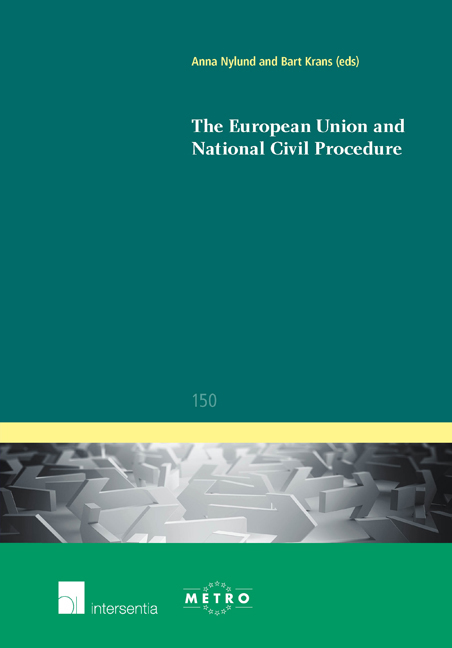Book contents
- Frontmatter
- Contents
- About the Authors
- List of Abbreviations
- The European Union and National Civil Procedure – A Rocky Road or a Smooth Process?
- Some European Challenges for Belgian Civil Procedure
- Danish Civil Procedure and the Internal Market: Impact and Challenges of Sectoral Harmonisation
- European Influences upon English Civil Justice: Tempests or Gentle Breezes?
- European Union and National Civil Procedure: The French Paradox
- The European Union and Civil Procedure from a German Perspective
- Interaction between European Law and Hungarian Civil Procedure Law
- The Impact of EU Law on Dutch Civil Procedure Law
- Norway: An Insider Outside – or an Outsider Inside – European Civil Justice
- Polish Civil Proceedings: How Much Europeanised?
- Slovenian Civil Procedure and the Transformative Power of the EU
- The Curious Incident of the Dog in the Night-Time: Europeanisation of Civil Procedure in Sweden
- Conclusions and Outlook
- Index
- Miscellaneous Endmatter
Some European Challenges for Belgian Civil Procedure
Published online by Cambridge University Press: 19 December 2017
- Frontmatter
- Contents
- About the Authors
- List of Abbreviations
- The European Union and National Civil Procedure – A Rocky Road or a Smooth Process?
- Some European Challenges for Belgian Civil Procedure
- Danish Civil Procedure and the Internal Market: Impact and Challenges of Sectoral Harmonisation
- European Influences upon English Civil Justice: Tempests or Gentle Breezes?
- European Union and National Civil Procedure: The French Paradox
- The European Union and Civil Procedure from a German Perspective
- Interaction between European Law and Hungarian Civil Procedure Law
- The Impact of EU Law on Dutch Civil Procedure Law
- Norway: An Insider Outside – or an Outsider Inside – European Civil Justice
- Polish Civil Proceedings: How Much Europeanised?
- Slovenian Civil Procedure and the Transformative Power of the EU
- The Curious Incident of the Dog in the Night-Time: Europeanisation of Civil Procedure in Sweden
- Conclusions and Outlook
- Index
- Miscellaneous Endmatter
Summary
The Invisible Pillar Raises Serious Compatibility Issues between EU (Case) Law and Belgian Civil Procedure Law
The European influence on national civil procedural law is multi-dimensional. As has been described by Bart Krans, a large part of the Europeanisation of national procedural law derives from what he has called the ‘invisible pillar’. Krans showed us not only the existence of such a type of European influence, but also demonstrated how vast this area is and that it covers a wide variety of topics. The invisible pillar differs from two other pillars of Europeanisation described by Krans because it is much less visible. It offers an intriguing interplay between European rules and decisions at one hand and national rules and court judgements at the other hand, due to the rather sneaky way in which it affects rules and procedural behaviour of judges and parties. Its impact is far-reaching and may not be underestimated as will be illustrated below.
The invisible pillar is two-headed. The first part of this pillar follows from the role of national civil procedure law in enforcing EU law. The European Court of Justice stressed at several occasions the principle of procedural autonomy of Member States. which implies that the national legal system of each Member State has to regulate the procedural rules governing the actions which are to ensure respect for the rights which individuals derive from EU law. As a consequence, EU law (oft en) needs national civil procedure law to find its way to European citizens. National courts have the duty to apply their procedural law in accordance with the so-called Rewe/Comet rule, i.e. in compliance with the principles of equivalence and effectiveness.
An example of this first area of the invisible pillar highlighted by Krans concerns the ex officio (of own motion of a judge or a court) application of EU Law in the field of consumer protection. Article 6 (1) of the Directive on unfair terms in consumer contracts provides: ‘Member States shall lay down that unfair terms used in a contract concluded with a consumer by a seller or supplier shall, as provided for under their national law, not be binding on the consumer and that the contract shall continue to bind the parties upon those terms if it is capable of continuing in existence without the unfair terms.’
- Type
- Chapter
- Information
- The European Union and National Civil Procedure , pp. 5 - 16Publisher: IntersentiaPrint publication year: 2016



